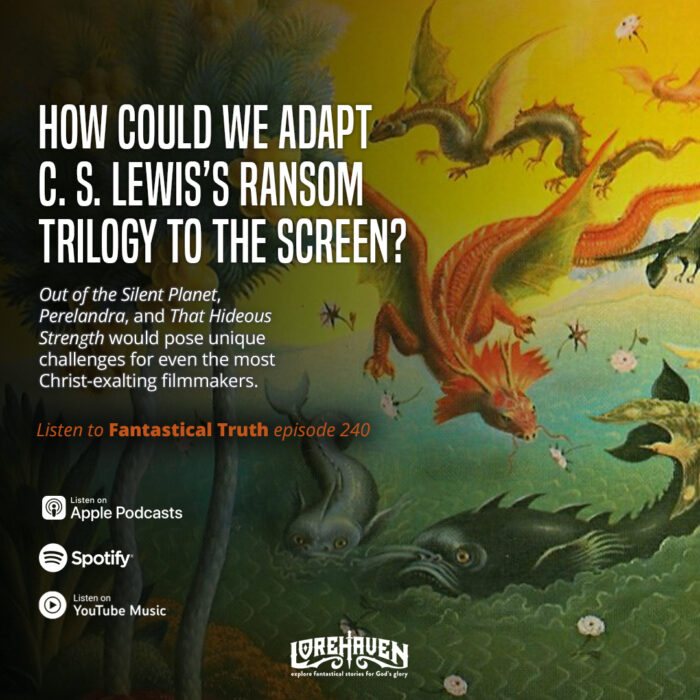Let’s Stop Making Up Unbelievers To ‘Evangelize’
Christians, we need to repent of a sneaky little sin. It’s this: We like to justify pretty much any wrong—from lame movies and shoddy storytelling, to bad nonfiction books and false teaching—by saying, “Oh, but it’s for evangelism. We just want more people to know Jesus.”
In many of our movies and novels, we’re making up shallow and sentimental “people” so we can more easily “get them to know Jesus.” And in real life, the habit gets even worse.
But until the last few weeks (you can just imagine what national-level thing helped bring this about) I had not often considered the connection between sentimental and unrealistic characters in Christian fiction, and what happens when we treat the fiction as if it’s real.
Perhaps in fiction this is easier to spot. No matter the genre, no matter the publisher, I’ve spotted examples of flagrantly shallow non-Christian characters who simply don’t act like real people I have met. In real life, non-Christians are ordinary people who think they are just fine, don’t care for biblical faith (or think they have it already), and would just as soon dodge any Christian’s attempt to have a heart-to-heart, actual come-to-Jesus moment.
But some evangelical fiction shows another picture. You would think that either all non-Christians are nasty villains, or else poor troubled people who can’t accept the concept of a loving God because they somehow already know how bad they’ve been. For example:
Charis wanted to cry. Did Michael really mean it? Was he really saying there was a good God who loved everyone in the world — everyone, including her? But he could not mean that, she thought. After all, she was not important, beautiful, wealthy, or special. No one could love her after all the bad things she had done. Not even God.
— Original dialogue, based on that of a Christian contemporary/speculative novel [edit: which at the time I’d recently read]1
Make no mistake. Many non-Christians are clearly suffering and troubled and open about it. They surely would respond to Christians who show them a helping hand. They might want to inquire more about faith. God does love them and wants us to be sensitive to their needs.

… But some men can’t be reasoned or negotiated with. Some men want to watch the world burn.
But it’s absurd for our fiction to suggest that these are the only kinds of non-Christians we’ll ever meet. It’s the Christian-fiction equivalent of a reversed redshirt: instead of dying early just to show how drastic the danger is, the made-up non-Christian exists just to show how wonderful Jesus is. But what if we only see Jesus helping or saving characters who already know they’re a mess and are already open to Him, for His convenience and the plot’s? That makes the story boring and redundant and ridiculous. That also shows that Jesus and the gospel will work exclusively in a G-rated, cleaned-up, pre-treated made-up world.
That, of course, is not the world we live in. Nor is it the nature of every real non-Christian.
Sure, some of our non-Christian neighbors may already know they’re a mess and they need Jesus. Some of them would open right up if we showed them love. And even the ones who outwardly embrace sin might give Christianity a second thought if Christians stopped acting all separatist—not only from the sin but the person—and showing them rejection.
But if we decide that these are the only types of real non-Christians we encounter, and that the only thing we need to do is act more loving, we are living inside a bubble. We’re making up a non-Christian character who’s as fake as any figure in a shallow Christian novel. We’re wishing that all the non-Christians we meet would conform to this caricature. And we wish just as hard that now we only need to show them more love than those bad Christians have.
This is the soft bigotry of low expectations. Hey, if all we need to do is out-holy the bad Christians, what happens to the standard of holiness from the Spirit in us?2
This is sentimentalism. Yes, all non-Christians are broken and suffering under the weight of sin. But few already recognize this truth. Many of them love their sin and cannot get enough of it. You know your own temptations to sin (oh, glorious, amazing sin!) that make you feel bad after you’ve done it? Imagine that, only with little to none of that bad feeling.
This is self-deception. Jesus constantly warned that people would hate Christians. He did not give disclaimers like, “And when they do, know that it’s your own fault.” Sometimes we do bring persecution “on ourselves.” And sometimes we view as persecution things that are not persecution (cf., angry social-network comments). But Jesus did not tell His people only to look constantly to ourselves and determine what we’ve done to have it coming. That’s legalism talking. Or, if we instead blame Those Other Bad Christians, it’s self-righteousness.
This does not help us love like Jesus. If you spend your whole life expecting and training and encouraging others to show love to someone who is already lovable—because they just need to see a more-loving Christian and then they’ll respond warmly?—you’re doomed to be disillusioned. The real challenge is far worse: You as a Christian are supposed to go up against people who hate you no matter what, and want to control you or even kill you, and still love them.3
And ultimately, this can become a false gospel. I can’t tell you the number of times I’ve heard this cliché: Jesus ate with tax collectors and sinners, so it’s okay to participate in a questionable activity.4
Except the relevant texts5 specify that Jesus had ordinary dinners with folks. He was not participating in the tax collectors’ Banquet to Commemorate Extortion or the prostitutes’ Festival for Financially Lucrative Fornication.
Except Jesus’s point in visiting with them was not to subvert God’s law, but made-up laws.
Except Jesus’s point was to show that the people need a great Physician, and that they must repent6 and believe the gospel and be part of the Kingdom.7
In Christian fiction as in real life, what if our gospel does not include repentance and faith? What if we kinda assume someone else will be “bad cop,” who takes care of the hellfire and repentance parts, so that we can be the “good cop” and only talk about the mercy and love parts? What if we skip over the dark and gritty bits in the name of “evangelism”? Then we are indeed “evangelizing.” But what we’re sharing is a made-up gospel, to made-up non-Christian characters, ultimately about a made-up Jesus who never did and does not exist.
This chance should make us reboot our reality. It should also reboot our favorite fiction. For what happens when our fiction characters behave more like real people instead of like sentimental pictures copied from shallow megachurch sermon anecdotes? The story gets better. The plot gets thicker. The themes get meatier. The pace quickens. And best of all, the Hero who beats the enemy—or better, befriends the enemy!—becomes far more awesome.
- From Fiction Christians from Another Planet! IV: Terror of the Megachurchians, E. Stephen Burnett at Speculative Faith, Jan. 31, 2013. ↩
- Phil. 2:12-13. ↩
- Contrary to popular myth, this does not mean always surrendering your rights. In the book of Acts the apostle Paul had three responses to persecution: run from it, face it, or face it while also calling it for the injustice that it is. The Christian who only ever reminds herself “surrender, just give in, don’t protest” is enabling injustice. We wouldn’t want such a Christian counseling a victim of a spiritually abusive cult or a violent husband. ↩
- This shows that Christians can easily determine what’s wrong, e.g.: “We’ve been too separate from culture!” But when it comes to correcting the wrong based on Scripture, we suck. It’s more convenient to establish a Rule. “X was wrong. Never do X!” ↩
- Matt. 9: 11-13, Mark 2: 15-17, Luke 5:29-32. ↩
- Luke 5:32. ↩
- Mark 1:14-15. ↩









































Oh, yes. Thank you so much for throwing a spotlight on this weakness found in much of Christian fiction. I knew the portrayal of Christians often bugged me, but you are right, too often the portrayal of non-Christians is ALSO shallow and not realistic. Love this: “It’s the Christian-fiction equivalent of a reversed redshirt: instead of dying early just to show how drastic the danger is, the made-up non-Christian exists just to show how wonderful Jesus is. ”
Come on, people, we can do better than that, right?
This reminded me of something I read from an atheist blogger who told a story about how a budding writer friend of hers pretty much copy-pasted her and her then-husband into a play and then used the God-mode of authorship to “fix” their lives according to how Budding Writer thought they should be (Link: https://rolltodisbelieve.wordpress.com/2015/03/29/why-im-going-to-spend-a-week-ripping-gods-not-dead-to-pieces/).
I think most of us know a “fixer” like that who may or may not have an outlet into writing, and it’s pretty creepy to consider what tiny little box they would shove us into, if they could, for our own “good,” especially if they think Jesus would back them up on what they thought was our “good.” Insert CS Lewis quote about how run-of-the-mill corrupt leadership could be sated, even if only temporarily, but a dictator hell-bent on correcting and cleansing the peasantry is relentless.